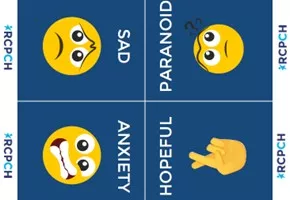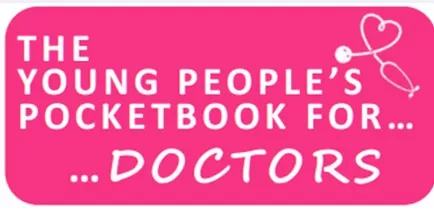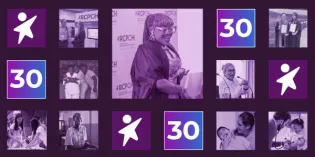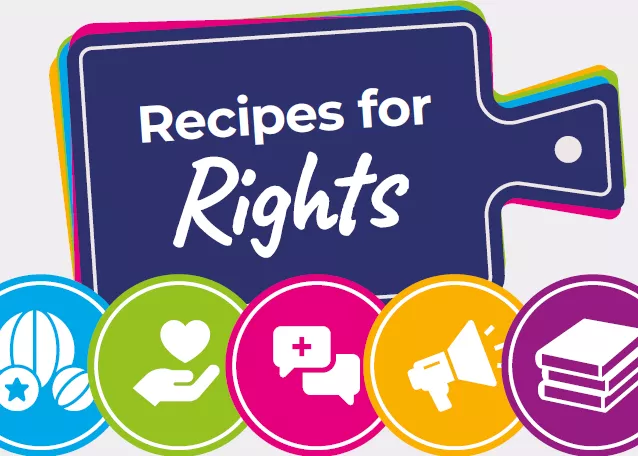- Recipes for Rights - our handbook
-
Recipes for Rights, published in September 2020, takes you through the United Nations Convention on the Rights of the Child (UNCRC) and the five articles that RCPCH &Us said are important to their healthcare.
The 'recipes' include; starter activities to break the ice; patient view finders for one-to-one work; and quality improvement activities to support groups of children, young people and their families to inform your work and service planning.
Created following a number of workshops across the UK with children and young people, this resource has 15 activities to support your work individually or as a team to explore what is important to your patients and stakeholders. The games can be used with minimum resources and work in person or digitally, plus can be adapted to sort your setting needs.
Associated activities include:
- Health appointment advice
-
What is this? This leaflet was created by young people and doctors to help explain the process for having an in person, phone or video appointment.
Who is it for? For health care professionals to share with CYP, their families and their local health service
How will it help me? It is a resource for you to share with your patients to help to improve understanding and experiences of health services. This leaflet provides information about how to get an appointment, what to expect, what will happen in your appointment and reminders for everyone involved that sometimes an in-person appointment may be needed.
Why was it created? It was created in response to increasing use of online appointments for CYP. The RCPCH &Us COVID Book Club, identified that there was a need for clear information about online or phone appointments so that children, young people and families know what to do. Young people from Central beds Youth Voice and RCPCH&US came together with Doctors from RCPCH, RCGP, RCPsych and BASSH to create this resource.
- Health diary
-
What is this? It's a digital and/or printable health diary for children and young people to complete between appointments to prepare for clinic by sharing their opinions, feelings and questions.
Who is it for? For healthcare professionals to share with the children and young people that they see.
How will it help me? This health diary can be filled in by the child or young person and then brought to clinic or emailed to you. It will help to engage children and young people in their clinic appointment and share what interests and concerns them with you.
Why was it created? It was created to help children and young people keep track of their health and to share their ideas and concerns with health care professionals.
- Healthy happy and well activity pack
-
What is this? This pack offers activities for CYP help keep them happy and well- from volunteering to help the NHS from your home to fun games and quizzes about RCPCH.
Who is it for? Children and young people
How will it help me? Share it with your patients to offer them activities to help them stay happy healthy and well, to learn about paediatricians, children’s rights and the NHS
Why was it created? It was created in the pandemic to support children staying at home.
Healthy happy and well activity pack (PDF)

- Vaccines and viruses information
-
What is this? Activity resources to facilitate informed discussions about viruses and vaccines
Who is it for? For health care professionals, youth workers and educators to share with children and young people
How will it help me? The Royal College of Pathologists created these resources to open conversations about topics such as viruses, immunity and vaccines with an aim to help dispel common myths and misconceptions. The collection includes art-science resources, guides to hands-on STEM activities for schools, video interviews and guides, and an FAQs section.
- Understand 101: Identifying areas for improving care
-
What is this? The UNDERSTAND model guides you on how to structure discussions to identify area of clinical care which are going well and areas where there might be need for improvement.
Who is it for? For healthcare professionals to facilitate discussion with children, young people and their families and carers.
How will it help me? This will help you to have a discussion that teases out what the healthcare experience is like for CYP and their families thereby providing patient-informed ideas for making healthcare quality improvements.
Why was it created? In 2016 a thousand CYP & families shared their ideas and views on how to improve child health services. The following year, two young people reviewed this for the RCPCH, analysed and brought out the key themes, then created the Understand model as a way for healthcare professionals improve how they work with CYP.

- Emoji card game: Talking about feelings
-
What is this? Emoji cards designed to start conversations about how children and young people feel when interacting with health care professionals.
Who is it for? Healthcare professionals to use with children and young people
How will it help me? It will help you to enable children and young people to share how they are feeling and to talk about what can be done to support them.
Why was it created? In 2017, 16 year old Amina worked as an RCPCH summer intern. She collated research from consultations with young people and discovered that many would like to use games to help them remain calm and focussed. She created the Emoji card game to address this and to help them discuss their feelings during conversations with health professionals.

- Health and wellbbeing passport, 'Being me'
-
What is this? Resources, posters & games to help children and young people share their feelings, talk about their experiences, and get the best health outcomes possible.
Who is it for? For health care professions to work through with the children and young people they see with specific resources for those who are in the care system
How will it help me? It will help children and young people to share who they are, how they feel and what support they might like so that you can all work together to ensure stay are happy healthy and well
Why was it created? More than 20 children in care council members at Warrington Borough Council, Knowsley council and RCPCH &Us created these resources over 5 months in 2019. They thought about what keeps us emotionally and physically happy, healthy & well then worked together to create resources including an individual health & well being passport as well as a game & poster
Please find the resources here:
- Passport: Children in Care (PDF)
- Passport: Young People in Care (PDF)
- Passport: Children in General (PDF)
- Passport: Young People in General (PDF)
- Feeling Tellers Game (PDF)
- Feelings Poster (PDF)

- Doctor's pocketbook for talking about mental health
-
What is this? A consultation model for how to talk to children and young people about their mental health
Who is it for? Healthcare professionals
How will it help me? The model provides you with a stepwise guide to discuss and offer support for mental health concerns when they are shared by children and young people in your health care interactions.
Why was it created? RCPCH consulted children and young people across England in 2016 about how to improve their experience in mental health. Our 2016 summer intern Papia (age 17) created this tool to communicate the expectations of these children and young people in their health care interactions.
Doctor's pocketbook for talking about mental health (PDF)

- Top tips for paediatricians and healthcare workers
-
What is this? Top tips from children and young people about what qualities and behaviours they like to see in their healthcare professional
Who is it for? Healthcare professionals
How will it help me? It will help you reflect and improve on how you communicate and work with children and young people in healthcare interactions.
Why was it created? These stem from two pieces of work. Being Me top tips for doctors came from more than 20 children in care council members at Warrington Borough Council, Knowsley council and RCPCH &Us in 2019. The 21st birthday top tips are from 400 children & young people who shared their ideas in 2016-2017.
- Hidden health toolkit
-
What is this? This is a toolkit designed to support those with hidden health care issues to raise awareness of their conditions, to share what matters to them and to improve how those with hidden health concerns access support.
Who is it for? It is designed for both healthcare professionals and children, young people and their families.
How will it help me? Hidden health includes long term conditions, such as epilepsy and asthma, and hidden conditions, such as mental health needs and heart conditions - and the impact on the health of the carer. This toolkit will support discussions around what is important the child, young person or family. The aim is that you become more aware of the child as a whole - rather than just their medical condition or illness - and can signpost holistic support for both the patient and their family.
Why was it created? More than 20 parents and 15 young people shared their challenges with hidden health care issues and in response to this parents, carers and health care professionals from Alder Hey Children’s Hospital worked with RCPCH &Us in 2018-2019 to create checklists, cards and support materials to help parents/carers get the support they need and help health care professionals be able to deliver the best service possible.
- Hidden Health Toolkit (PDF)
- Hidden Health parent/carer checklist (PDF)
- Hidden Health Checklist for HCP (PDF)
- Hidden Health Cards (PDF)
- Hidden Health This is Me Cards (PDF)
- Hidden Health Local Support Poster (PDF)
More in our video:
- Giving Feedback About Your Health Service as a CYP
-
What is this? A video, template letter and example letter designed to help children and young people give feedback about their experience of at hospital or a clinic.
Who is it for? For health care professionals to direct their patients to
How will it help me? These resources will support children and young people to give feedback about their health care with information about where to send feedback and what to expect once it has been sent. It also includes a template of a feedback letter.
Why was it created? To help children and young people share their experiences with healthcare professionals with the aim of improving health care
Resources links:
- Asthma Leaflets for children and young people
-
A group of asthma experienced or interested children, young people and families volunteered together to improve care for asthma patients and their families. Established in 2019, the Asthma &Me Ambassadors formed to support the National Asthma and COPD Audit Programme (NACAP), brings their voices, experiences, hopes and wishes to life through youth-led project work and advocacy.
Read here about their award-winning project and the young people involved!
They have worked with NACAP to create new patient leaflets to help patients and families to know what happens when you go to A&E with an asthma attack, how to stay healthy, happy and well as well as hints and tips for asthma care. There are three leaflets depending on age - and some have games and activities in them!
- Useful external links
-
These resources aim to improve your communication with CYP people you work with, and cover varied topics:
Engaging children and young people - improving communication
We have collated a number of resources and RCPCH &Us project work which gives you practical tools and advice on how healthcare professionals can improve their communication with children, young people and their families. Much of this content has been created with children and young people and includes a range of topics including mental health, hidden health and children in care.








